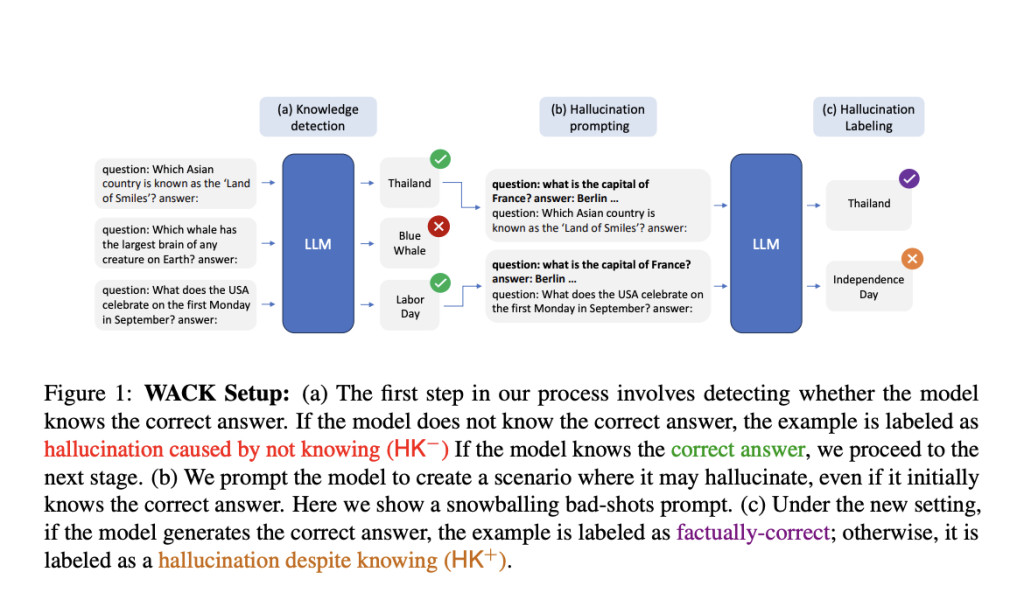

Large Language Models (LLMs) are widely used in natural language tasks, from question-answering to conversational AI. However, a persistent issue with LLMs is “hallucination,†where the model generates responses that are factually incorrect or ungrounded in reality. These hallucinations can diminish the reliability of LLMs, posing challenges for practical applications, particularly in fields that require accuracy, such as medical diagnostics and legal reasoning. To improve the trustworthiness of LLMs, researchers have focused on understanding the causes of hallucinations. They categorize hallucinations as either arising from a lack of knowledge or errors occurring despite the model’s correct information. By targeting the roots of these errors, researchers hope to improve the effectiveness of LLMs across various domains.
Researchers address two distinct phenomena in distinguishing between hallucinations caused by absent information versus misapplied knowledge. The first type occurs when the model lacks the necessary information, such as when prompted with questions about specific, lesser-known facts. In this case, LLMs tend to invent plausible-sounding but incorrect responses. The second type arises when the model has the knowledge but still generates a wrong answer. Such hallucinations indicate a problem with how the model processes or retrieves its stored knowledge rather than an issue of knowledge scarcity. This distinction is essential as different errors necessitate different interventions.
Traditional methods of mitigating hallucinations in LLMs do not address these distinct causes adequately. Prior approaches often combine both errors under a single category, leading to “one-size-fits-all†detection strategies that rely on large, generic datasets. However, this conflation limits the ability of these approaches to identify and address the different mechanisms underlying each error type. Generic datasets cannot account for errors occurring within the model’s existing knowledge, meaning valuable data on model processing errors is lost. Without specialized datasets that focus on errors arising from knowledge misapplication, researchers have been unable to effectively address the full scope of hallucinations in LLMs.
Researchers from Technion – Israel Institute of Technology and Google Research introduced the WACK (Wrong Answer despite Correct Knowledge) methodology. This approach creates model-specific datasets to differentiate between hallucinations due to absent information and those arising from processing errors. WACK datasets are tailored to each model’s unique knowledge and error patterns, ensuring that hallucinations are analyzed within the context of the model’s strengths and weaknesses. By isolating these errors, researchers can gain insights into the distinct internal mechanisms that give rise to each kind of hallucination and develop more effective interventions accordingly.
The WACK methodology utilizes two experimental setups, “bad-shot prompting†and “Alice-Bob prompting,†to induce hallucinations in models with the correct knowledge. These setups create prompts that simulate scenarios where users or models make subtle errors that lead to hallucinations, even when the model theoretically knows the correct answer. In “bad-shot prompting,†false answers that resemble correct ones are deliberately introduced into the prompt, simulating a “snowballing†effect where one incorrect answer leads to another. In the “Alice-Bob prompting†setup, incorrect information is added subtly through a story-like prompt to mimic minor errors a user might introduce. By using these techniques, WACK captures how LLMs respond to contextually confusing scenarios, generating datasets that provide more nuanced insights into the causes of hallucinations.
Results from the WACK methodology demonstrated that model-specific datasets significantly outperform generic datasets in detecting hallucinations related to knowledge misapplication. Experiments with models such as Mistral-7B, Llama-3.1-8B, and Gemma-2-9B showed marked improvements in detecting “hallucination despite knowledge†(HK+) errors using WACK datasets. For example, while generic datasets yielded 60-70% accuracy in identifying these errors, WACK’s model-specific datasets achieved detection rates as high as 95% across different prompt setups. Furthermore, tests using WACK data revealed that models could identify HK+ errors preemptively, based solely on the initial question, a result unattainable with traditional post-answer assessments. This high level of precision highlights the need for tailored datasets to capture nuanced model-specific behaviors and achieve superior hallucination detection.
The WACK research highlights several key insights into the dynamics of LLM hallucinations:
- Precision in Error Differentiation: Model-specific datasets capture subtle differences in hallucination causes that generic datasets overlook, allowing for interventions that target knowledge scarcity and processing errors.
- High Accuracy in HK+ Detection: WACK demonstrated up to 95% accuracy in identifying knowledge-based hallucinations across different LLMs, outperforming traditional detection methods by up to 25%.
- Scalability and Applicability: The WACK methodology’s ability to generalize across models shows its adaptability for many LLM architectures, providing an effective blueprint for future LLM refinements.

In conclusion, by distinguishing between hallucinations due to absent knowledge and those arising from misapplied knowledge, the WACK methodology offers a robust solution to enhance LLM accuracy and reliability. Tailored, model-specific datasets provide the nuanced detection required to address each type of hallucination, marking a significant advance over generic approaches. The researchers’ work with WACK has set a new standard for understanding and mitigating hallucinations, enhancing the reliability of LLMs, and broadening their application across knowledge-intensive fields.
Check out the Paper. All credit for this research goes to the researchers of this project. Also, don’t forget to follow us on Twitter and join our Telegram Channel and LinkedIn Group. If you like our work, you will love our newsletter.. Don’t Forget to join our 55k+ ML SubReddit.
[Trending] LLMWare Introduces Model Depot: An Extensive Collection of Small Language Models (SLMs) for Intel PCs
The post WACK: Advancing Hallucination Detection by Identifying Knowledge-Based Errors in Language Models Through Model-Specific, High-Precision Datasets and Prompting Techniques appeared first on MarkTechPost.
Source: Read MoreÂ

